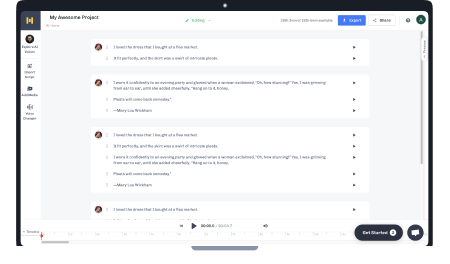AI in eLearning: Top AI eLearning Tools for Empowering Young Minds

Do you remember the scene from The Shawshank Redemption when Andy emerges from the pipe in the middle of a rainstorm? Or the scene in Avengers: Endgame where Captain America lifts Mjolnir?
You remember them with copious details, right? OK, now try recalling anything you learned yesterday at your training or school.
Well, you may not have much luck with it. Wonder why?
The movie scenes have top-notch storytelling, connecting emotions, and sensory-rich experiences. Unfortunately, this cannot be said about our learning at schools or training.
But there is hope yet in the form of eLearning tools that can create rich learning experiences tailored to everyone's taste and preference. But there's a small problem there's too many of them.
That's why, in this blog post, we talk about the top eLearning tools, their features, and how to choose the best one to help you make an informed decision.
Let's get started.
The Wonders of AI in eLearning
AI in eLearning refers to using AI technologies in learning processes with the help of eLearning tools. These AI-powered eLearning tools are used in diverse ways. For example, ML can be used to analyze a learner’s performance to chart custom study pathways. Likewise, by using NLP-enabled chatbots and virtual tutors, these ai tools can answer learners' questions in real-time.
How Will AI Affect the Education Market?
Learning have historically been a one-size-fits-all situation with no room for personalized learning. However, with AI in the mix, educators and schools can use AI-powered eLearning authoring tools to develop eLearning content suitable for students with special needs and disabilities.
In the Artificial Intelligence in Education: 2023 Survey, Holon IQ says that AI technologies like Vision, Voice, Language, and Analytics are changing the way the world is learning.

Here are a few ways AI is transforming the eLearning industry:
- AI analytics and Intelligent Adaptive Learning have the most impact on the education sector. They help create learning paths tailored to each individual learner.
- Computer vision helps with eye tracking, capturing mouse movements, and sentiment analysis to assess learner engagement.
- Educators extensively use AI-powered eLearning platforms for streamlining instructional design processes and creating dynamic learning content like online courses, quizzes, summaries, and interactive lessons.
- AI tools help automate grading, assessments, and administrative processes. This helps save educators time and effort.
- Tools with AI capabilities enhance learning accessibility with text-to-speech, translations, and assistive technologies.
Top 10 AI-based eLearning Tools in 2026
Whether you are an educator, a learning manager, or a student, finding the best AI-based eLearning tools is vital.
Let’s check the top eLearning authoring tools to try in 2026.
ChatGPT

ChatGPT helps make learning fun, smart, and easy. Both its free and paid versions allow educators and learners to create eLearning content (images, infographics, etc), find answers to questions, and explain tough topics in simple ways. ChatGPT can also be integrated to diverse online learning courses to help students interact with it and resolve doubts. The best part about ChatGPT is that it can match the learner's individual learning style and preferences.
Key Features
- Access tutorials, case studies, and research papers from the web in ChatGPT UI.
- Personalized learning support with tailored answers and explanations.
- Build quick eLearning courses and materials on any topic for free.
- 24x7 on-demand tutoring support with an internet connection.
- Learning support in multiple languages for learners worldwide.
Gradescope

Gradescope is an online grading platform that allows teachers to assess written exams, bubble sheets, and homework more efficiently and cut their grading time in half while keeping the feedback fair and clear. The platform is suitable for educators looking to improve teaching productivity and reduce time on grading. Its AI-powered system groups similar answers, letting you grade multiple submissions simultaneously.
Key Features
- Access the platform from anywhere to assess student assignments.
- Use Gradescope on Canvas, Blackboard, and Moodle.
- Review regrade requests from students anytime.
- Detailed insights into the performance of each of the students.
Carnegie Learning

Carnegie Learning is a learning solutions provider for students from elementary school to high school. The platform also has an AI assistant called MATHia to assess each student's performance and tailor learning journey to fit the student's individual performance. It offers three unique learning solutions to students and a support solution for teachers.
CLEAR Math: To make math meaningful via collective exercises and individual practices.
CLEAR Literacy: To make students lifelong learners through reading habits.
CLEAR Languages: To help students learn world languages.
CLEAR Services: To help teachers perform as well as their students.
Key Features
- Monitor classroom activity in real time and get alerts with the LiveLab feature.
- Workshops, coaching, and resources to help educators improve skills.
- Highlight learning content and add notes on digital notebooks.
- Use MATHia, an AI-driven tutoring tool, to customize math lessons for students.
Edmentum

Edmentum offers personalized eLearning authoring tools and resources for educators and students. The platform offers diverse eLearning programs like EducationCity, Courseware, Academy, and more. Students can get tailored instructional support with Edmentum, while educators can get data-driven learning insights to improve teaching strategies.
Edmentum also offers professional development opportunities to teachers to enhance their teaching skills.
Key Features
- Personalized virtual tutoring and success coaching for better learning.
- Provides high-quality, certified teachers to meet teacher shortages.
- Choose from an extensive library of tutorials, programs, and courses
- Flexible options that match students' schedules and personal learning needs.
Cognii

Cognii is an AI-powered eLearning platform that serves educational institutes and businesses to create and distribute learning programs and training content. Cognii’s Virtual Learning Assistant helps students via interactive conversations.
The assistant prompts students to build answers using their own words and offers instant feedback to improve. Teachers can also benefit from Cognii's AI-powered tools by reducing grading time and providing deep insights into student progress.
Key Features
- Custom questions and coaching based on real-time student progress and needs.
- Open-response questions and self-constructed answers to help students.
- Receive instant scores and personalized feedback while learning.
- Get tailored hints through lessons from Cognii for personalized learning.
- Automated, consistent, and high-quality feedback to reduce instructors' workload.
Knewton Alta

Knewton Alta is an adaptive learning platform for personalized learning experiences. It offers integrated instructional content (text and videos) aligned with specific learning objectives. The platform figures out the learning style, strengths, and weaknesses of the students as they use it and delivers targeted learning support. This continuous learning helps students address knowledge gaps by revisiting only required concepts.
Key Features
- Quick, detailed, and personalized feedback for each question.
- Predictive analytics to understand the test readiness of the students.
- Personalized study plan for each student as per their learning history.
- Targeted training materials and content for tailored learning experiences
- Support for subjects such as biology, chemistry, physics, math, and statistics.
Duolingo

Duolingo is a popular app for learning languages in a fun, engaging way. It offers lessons in over 30 languages, including Spanish, French, and Japanese. The app uses game-like features to make learning enjoyable and effective. You can earn points, unlock levels, and maintain streaks to stay motivated while taking lessons. Apart from its individual-focused services, Duolingo also offers corporate solutions.
Key Features
- Interactive daily practices for reading, writing, listening, and speaking on Duolingo.
- Gamified learning allows users to earn points and unlock levels for skill improvement.
- Access Duolingo on your phone or computer anytime for flexible learning.
- Personalized learning with lessons adjusting as per learners' performance.
Querium

Querium offers StepWise, an AI-driven tutoring program for students who want to master math skills. The StepWise AI Tutor guides learners through each step of the math problem and provides instant feedback to correct mistakes. This approach enhances learners' understanding and boosts their confidence.
Key Features
- Interactive, problem-solving learning exercises to help students master math.
- Quick feedback on each answer to help students learn from mistakes.
- Targeted learning by adapting lessons to each student’s skill level.
- Clear, step-by-step instructions to solve math problems and learn better.
- Integrate Querium’s tools into publisher and schools' existing learning systems.
DreamBox Learning

DreamBox Learning is an adaptive learning platform that helps math and reading skills for K-12 students. In math, the platform uses fun, interactive exercises to boost students' problem-solving skills. In reading, it uses engaging stories and tasks to improve students' fluency, comprehension, and vocabulary.
The platform tracks progress and updates lessons in real time to tailor lessons as per students' progress and teachers can access these detailed reports to guide better learning.
Key Features
- The adaptive technology varies difficulty levels and types of questions in real time.
- Courses align with core or state standards for a better learning.
- Get real-time reports on students' performance to tailor courses and topics.
- Extensive math and language learning curriculum to help students of all levels.
- Gamification elements, like rewards, avatars, etc., for better learning.
Murf AI

Murf AI is a text to speech platform that transforms text into natural-sounding voiceovers. It offers 200+ AI voices across 20+ languages, catering to diverse audiences and industries. Users can customize voice parameters like pitch, speed, and tone to match specific requirements in videos, podcasts, and e-learning content.
Murf AI's intuitive interface ensures ease of use for beginners and professionals. It integrates seamlessly with Canva, Google Slides, and more for better workflow and efficiency.
Murf AI combines advanced AI technology with user-friendly features to create human-like and engaging audio content.
Key Features
- Add Murf AI's API to your learning apps, platforms, and portals.
- Create custom human voice clones with emotions using Murf AI.
- Create realistic, human-sounding voiceovers with Murf Gen 2 TTS.
- Give unique voices to your AI tutor in your learners' native languages.
- Choose from 20+ languages and 200+ voices for local eLearning content.
- Translate scripts and eLearning content with Murf AI translation in minutes.
- Use custom emphasis, pronunciation, and pauses suitable for your learners.
Choosing the Right AI eLearning Tool: What to Look For?
Here are three key elements to look for in your eLearning tool:
What learning problems are you trying to solve?
Identifying the learning problems you want to resolve is key to picking the right tool. Here's how you can do that:
- Audit your eLearning processes: Identify the challenges in your eLearning processes, like time-consuming content creation or delayed learner feedback.
- Gather feedback: Speak to learners and educators to understand the issues they face—monotonous content or the inability to personalize learning.
- Assess current tools: Check if your current eLearning tool matches your needs. For example, does the tool offer support to multiple subjects? Or does it offer image generation features?
What are your integration requirements?
You may already be using different systems to learn and communicate. So, pick a tool that can be integrated with other tools, like Google Drive, Gmail, Outlook, or Slack.
If you already have a Learning Management System (LMS) in your tech stack, check the tools that integrate well.
Here are a few things to consider:
- Will you need more technical support for integration?
- Can you handle it in-house, or need to hire support?
- Does the eLearning tool offer you integration help?
Is the eLearning tool easy to use?
The idea of using a new tool for eLearning is to make your process smoother and add value to all stakeholders. Hence, ensure that the tool is easy to use.
While checking the tools, make sure:
- The tool has a short learning curve.
- It has adequate tools for educators and learners.
- The UI is easy to understand with no unnecessary items.
Who are the stakeholders of the eLearning tool?
Before you make the decision, identify who's going to use the tool. It will help you choose a tool that will meet the needs of all stakeholders.
- Students: A tool that's easy to use, accessible across multiple devices, and offers features to start where the student has let off.
- Educators: Educators will need a tool that lets them assess student assignments, track student performance, and change learning courses as needed.
- Administrators: They will need a tool that makes it easy to manage courses, generate images and written text for courses on the go, and integrate with other systems.
Wrapping Up
According to Global Market Insights Inc., the market for AI in education is expected to be worth more than US $20 billion by 2032. The major reason for this is the increased adoption of AI tools by 51% of educators. Apart from this, educators also use AI to plan lessons, conduct research, and streamline learning processes.
With automated content creation, real-time learner feedback, and more immersive learning with AR/VR in the pipeline, AI will redefine how we learn and acquire knowledge in the next few years.

Frequently Asked Questions
How do teachers use AI in eLearning?
.svg)
Teachers use AI to speed up grading, analyze students' performances, create new content for training, adjust learning materials, and simplify parts of courses to help students learn better.
How is AI used in eLearning?
.svg)
AI is used in eLearning to create text, image, and video content for courses, analyze learner performance, create voice for eLearning courses, and improve eLearning efforts from learner progress.
What are some of the best AI eLearning tools?
.svg)
Murf AI, Carnegie Learning, Cognii, and Knewton Alta are some of the best eLearning tools. While these are the best, it is wise to use tools that meet your requirements.















